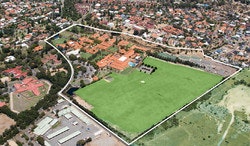Year 11 Literature ATAR
The Year 11 Literature ATAR course offers students a detailed study of a number of text types including poetry, prose and drama. Students are required to analyse texts from different reading positions and by applying literary theory. This course also requires a creative writing submission. The course is designed for students who wish to study Literature ATAR in Year 12 and sit a WACE Literature ATAR exam to gain university entrance.
The Literature ATAR course focuses on the study of literary texts and developing students as independent, innovative and creative learners and thinkers who appreciate the aesthetic use of language; evaluate perspectives and evidence; and challenge ideas and interpretations. The Literature ATAR course explores how literary texts construct representations, shape perceptions of the world and enable us to enter other worlds of the imagination. In this subject, students actively participate in the dialogue of literary analysis and the creation of imaginative and analytical texts in a range of modes, media and forms.
Students enjoy and respond creatively and critically to literary texts drawn from the past and present and from Australian and other cultures. They reflect on what these texts offer them as individuals, as members of Australian society and as world citizens. Students establish and articulate their views through creative response and logical argument. They reflect on qualities of literary texts, appreciate the power of language and inquire into the relationships between texts, authors, readers, audiences and contexts as they explore ideas, concepts, attitudes and values.
Unit 1
Unit 1 develops students' knowledge and understanding of different ways of reading and creating literary texts drawn from a widening range of historical, social, cultural and personal contexts. Students analyse the relationships between language, text, contexts, individual points of view and the reader's response. This unit develops knowledge and understanding of different literary conventions and storytelling traditions and their relationships with audiences. A range of literary forms is considered: prose fiction, poetry and drama. The significance of ideas and the distinctive qualities of texts are analysed through detailed textual study. Through the creation of analytical responses, students frame consistent arguments that are substantiated by relevant evidence. In the creation of imaginative texts, students explore and experiment with aspects of style and form.
Unit 2
Unit 2 develops students' knowledge and understanding of intertextuality, the ways literary texts connect with each other. Drawing on a range of language and literary experiences, students consider the relationships between texts, genres, authors, readers, audiences and contexts. The ideas, language and structure of different texts are compared and contrasted. Exploring connections between texts involves analysing their similarities and differences through an analysis of the ideas, language used and forms of texts. Students create analytical responses that are evidence-based and convincing. By experimenting with text structures and language features, students understand how their imaginative texts are informed by analytical responses.
Assessment
The following types of assessments and weightings will be undertaken:
Extended Written Response: 10% | Short Written Response: 40% | Creative: 10% | Oral: 10% | Examination: 30%
Examinations will take place at the end of Semesters One and Two and will cover key content of the unit or units covered in that semester.
Reporting
The achievement for the unit will be reported as a College A - E grade. In addition, the student's approach to class work and behaviour will be reported via the usual key performance indicators.
Student Expectations/Homework
Students will be expected to complete approximately 2.5 hours of homework each week. This time should be spent consolidating material covered in class as well as any assigned tasks.
